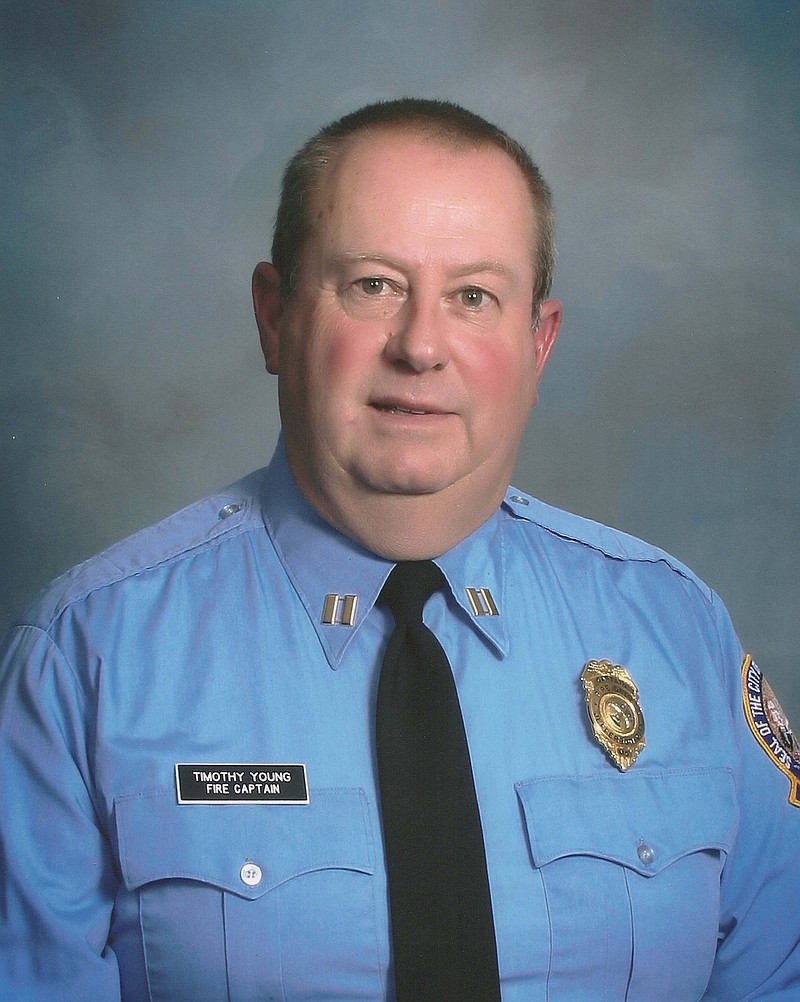Local resident Tim Young recalls a specific incident many years ago that helped ignite two complimentary interests - the first, to serve in the military and secondly, to become a firefighter.
"I had an uncle who was in the Air Force," recalls Young, 58, Jefferson City. "He took me on a tour of the base fire station at Blytheville, Ark., when I was younger. This really spurred my interest in the fire service."
The impact of his early exposure to military firefighting came to fruition shortly after Young graduated from high school in 1973.
The following year he enlisted in the Air Force and was guaranteed a slot as a firefighter. He went on to complete basic training in Texas and was assigned the Chanute AFB in Rantoul, Ill., for his advanced training.
"This was the DOD fire school," Young said. "They trained firefighters from every branch of the service."
During the training, which Young explains was similar to a civilian fire academy, the class was given a final exam consisting of a 5,000-gallon jet fuel fire staged around a mock-up aircraft and seven dummies representing casualties scattered around the area.
To complete the course requirements, the class had to extinguish the fire in five minutes or less and rescue the dummies. Young and his fellow classmates were successful and graduated as firefighters in February 1975.
The inexperienced airman took two weeks of leave back home in the St. Louis area before reporting to his first duty assignment as a firefighter at Reese AFB in Lubbock, Texas. For the next 18 months, Young enjoyed performing the duties associated with his new position.
"It was exciting to be on my own for the first time ... but also having the security of a place to sleep, meals and enjoying a job that you loved," he said. "It was just like (civilian) firefighting schedules - working an assigned shift and responding to fire emergencies on base.
"Anytime the pilots were flying, we also had firefighters on alert status in case there was an emergency," he added.
In 1978, with his enlistment expiring, Young made the decision to leave the service and return to Missouri to pursue a civilian career in firefighting.
He relocated to Columbia and over the next several years, worked jobs with the City of Columbia and the University of Missouri Hospital, in addition to volunteering with the Boone County Fire Department.
The veteran garnered many benefits during his tenure in the service including professional firefighting experience and college credit through the Community College of the Air Force, but continued to benefit from his investment even after leaving the service.
"For two years (1981-1983)," Young said, "I would drive from Columbia to East Central College in Union one night a week to finish my associate's degree in fire protection. I was able to use the GI Bill benefits I had earned to help cover the costs."
However, it was not until 12 years after leaving the service that he received the opportunity to embrace - in a full-time capacity - his interest in firefighting when he was hired by the Jefferson City Fire Department in 1990.
Young relocated to Jefferson City, where he met his wife, Susanne, the following year.
Throughout the course of the past two decades, Young has progressed through the ranks of the JCFD becoming a driver in 1996, and later receiving a promotion to the rank of captain.
Grateful for the early introduction to the both the military and firefighting provided by his uncle many years ago, Young asserts that his time in the Air Force has exposed him to several important life and occupational skills.
"By the time I became involved in firefighting in a civilian setting, I was already accustomed to the fire company setting ... the overall environment and the calls you have to deal with on a routine basis," he said.
"And all of the training I received in the service - the teambuilding and interaction with others in order to accomplish a mission - has prepared me to be successful regardless of the environment."
Jeremy Amick is the public affairs officer for the Silver Star Families of America.

